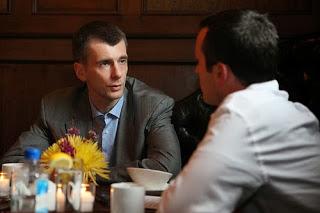
Vinnie Rotondaro
I also want to recommend today Vinnie Rotondaro's examination of why Pope Francis's message of merciful concern for the poor, which is, after all, as old as the gospels, seems to come as such a surprise to so many people, American Catholics included. The reason Francis surprises us, Rotondaro surmises, is that he's so unlike many members of his own hierarchy--the U.S. bishops certainly included:
Why? Take a look at the agenda items addressed earlier last month by the U.S. Conference of Catholic Bishops at their annual meeting in Baltimore. The bishops of the richest, most powerful and increasingly unequal nation in the world, convening in a city wracked by generational poverty, talked about pornography, they discussed contraception and gay marriage, and addressed questions of minor liturgical importance. Poverty was not on the agenda.
The image offered up was that of a place where the old guard rules, where reactionary tsk-tskers inveigh on what people can and cannot do in their personal lives, where "liberal" political concerns are mentioned while “conservative” causes are crusaded over.
The real surprise, though, is that the current congeries of bishops in the U.S. are not just unlike Francis, but that they're unlike their own predecessors, who played a strong role in the development of progressive public policy throughout the 20th century. When the U.S. Catholic bishops wrote their pastoral document Economic Justice for All in 1986 challenging the assumptions of Reaganomics and its trickle-down voodoo economics, there was wide public buy-in for its message that exclusion of anyone from full participation in the social and economic life of the community is radically wrong.
But then the Vatican (under the leadership of Pope John Paul II and his successor who was then Cardinal Ratzinger, heading the Congregation for the Doctrine of the Faith) stepped in and began to clip the wing of national bishops' conferences. And now we have a plethora of bishops who pay lip-service to the social teachings of the church, but whose obsessive focus on culture-war issues and unabashed promotion of the agenda of the Republican party leaves many Catholics and many of their fellow citizens with the impression that the bishops don't actually care in the least about poverty. Or homelessness. Or hunger. Or lack of education and access to healthcare. Or socioeconomic exclusion from participation in the life of the human community.
How could such a thing possibly have happened, given the history of the U.S. bishops through much of the 20th century? Rotondaro concludes:
Whatever one’s politics or cultural inclinations, it’s clear things would be better off if our neighbors and loved ones weren’t losing their mortgages, their faith in, or shot at, the American dream; their limbs, minds in faraway wars, their lives here at home, to drugs, gun violence and super-charged environmental disasters. This is so obvious. This too is Catholic. So how is it that the bishops haven’t been stronger, more forceful, louder in their stance on social justice when that voice is so badly needed?
Perhaps Pope Francis can provide an answer.
"The faith becomes ideology and ideology frightens," he says. "Ideology chases away the people, distances, distances the people and distances the Church of the people. But it is a serious illness, this of ideological Christians. It is an illness, but it is not new, eh?"
I'm grateful to Evagrius for recommending this article to me yesterday in a comment here.
The photograph of Vinnie Rotondaro by Matt Rodigheri is from Huffington Post.

